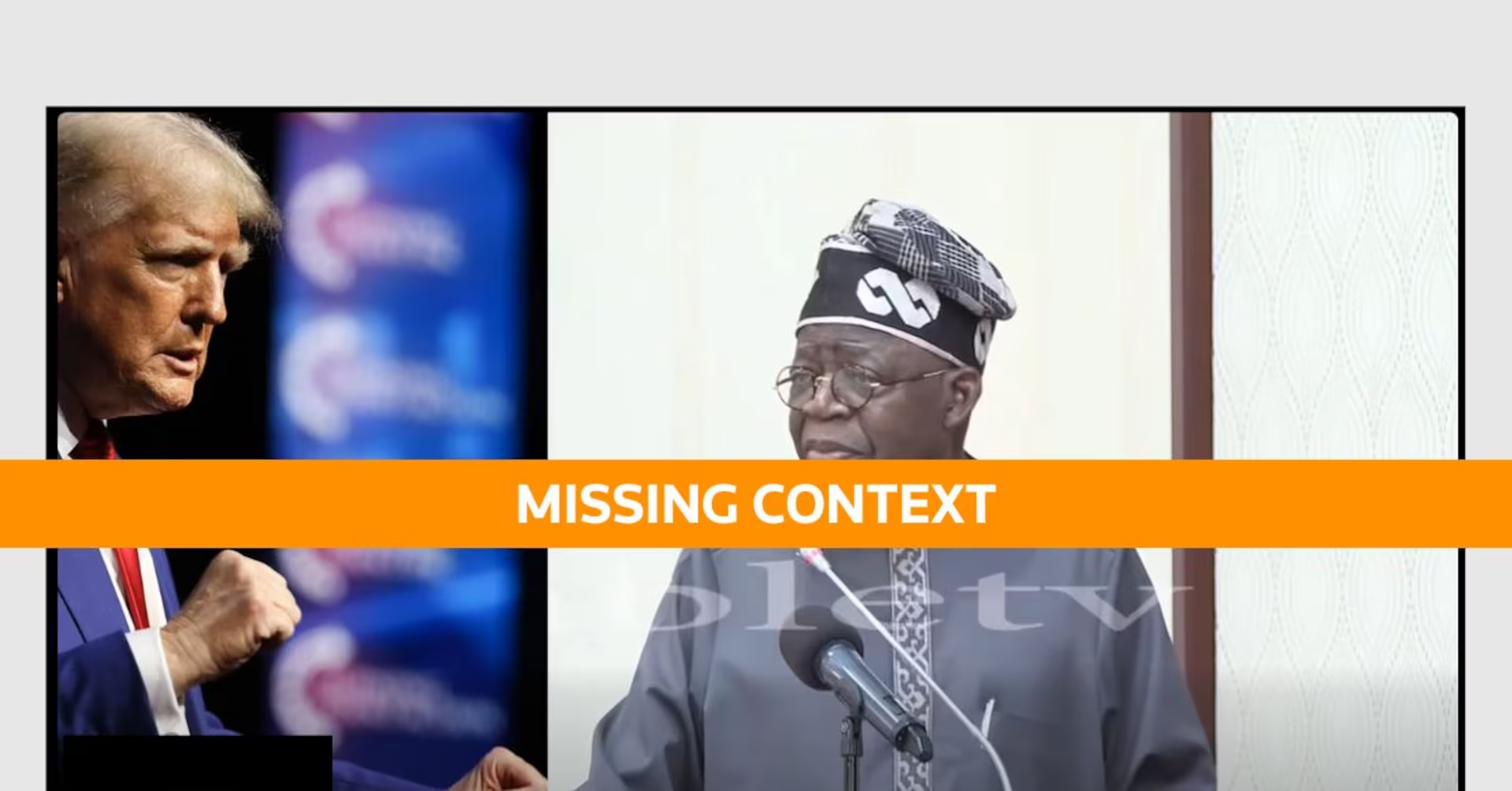Listen to the article
Social media users are circulating a misleading video that falsely presents Nigerian President Bola Tinubu responding to recent threats made by U.S. President Donald Trump. Fact-checking reveals the footage was recorded months before Trump’s controversial remarks about potential military intervention in Nigeria.
The video, which shows Tinubu at a podium saying, “We have no fear of whatever Trump is doing,” has been widely shared across Facebook and other platforms since early November. One post, dated November 3, carried the caption: “Breaking News….. President Bola Tinubu has finally Replied Donald Trump. Omg,” suggesting it was a direct response to Trump’s comments about Nigeria.
However, Reuters has confirmed that the footage predates Trump’s November 2 statement by approximately two months. The original video was published by Nigerian news outlet Channels Television on September 2 with the title: “Nigeria Has Met Revenue Target, Not Borrowed Locally — Tinubu.”
The full context of the recording shows Tinubu addressing visitors at the Presidential Villa in Abuja, where he was discussing Nigeria’s economic performance and fiscal policies. His passing reference to Trump was unrelated to the recent controversy and made in an entirely different context.
On November 2, Trump suggested that the United States could deploy military forces to Nigeria or conduct airstrikes, claiming large numbers of Christians were being killed in the West African nation. “We’re going to have the military go over and take care of it one way or the other,” Trump said during a campaign event in Virginia, raising concerns about potential U.S. intervention in Nigeria’s domestic affairs.
A spokesperson for President Tinubu has confirmed to Reuters that the circulating video is not recent and has no connection to Trump’s November statements. The spokesperson added that Nigeria would welcome American assistance against insurgent groups, but only if Washington respects Nigerian sovereignty.
The circulation of this misleading content highlights ongoing challenges with misinformation on social media platforms, particularly during politically sensitive moments. The false framing of the video gained significant traction as tensions between the two nations appeared to escalate following Trump’s remarks.
Nigeria, Africa’s most populous country with over 200 million citizens, has faced security challenges from various insurgent groups, including Boko Haram and armed bandits operating in the country’s northern regions. Religious violence has occurred in parts of the country, but security experts note that conflicts often have complex ethnic, economic, and political dimensions beyond religious identity.
The diplomatic relationship between Nigeria and the United States remains important for both nations. The U.S. is one of Nigeria’s largest trading partners, and Nigeria is a key regional ally for American security interests in West Africa.
As social media continues to play a significant role in shaping public discourse and international relations, the incident underscores the importance of verifying content before sharing, especially when it pertains to sensitive geopolitical matters.
Reuters has categorized this claim as “missing context,” noting that while the video itself is authentic, its presentation as a response to Trump’s recent statements is misleading and factually inaccurate.
Fact Checker
Verify the accuracy of this article using The Disinformation Commission analysis and real-time sources.




10 Comments
This case highlights the need for greater media literacy and critical thinking skills, especially when it comes to online content. Verifying the source and context of information is key to avoiding the spread of misinformation.
It’s concerning to see how old statements can be taken out of context and presented as a response to current events. Responsible journalism and fact-checking are essential to prevent the proliferation of misinformation.
This is a good reminder of the importance of context and nuance when it comes to political rhetoric. Jumping to conclusions based on snippets of information can lead to the spread of falsehoods.
Agreed. It’s crucial to look at the full context and timeline of events to get the complete picture, rather than relying on isolated soundbites or viral social media posts.
Interesting how old footage can be misrepresented and spread on social media. It’s important to verify the context and timeline of these kinds of videos before jumping to conclusions. Fact-checking is crucial in today’s information landscape.
This highlights the need for media literacy and critical thinking when consuming online content. Verifying the source and timeline of information is key to avoiding the spread of misinformation.
Absolutely. It’s easy for misleading narratives to take hold, especially when they align with certain political agendas. Maintaining a healthy skepticism and cross-checking facts is the best defense.
It’s disappointing to see how easily old footage can be misrepresented and used to push a certain narrative. Responsible reporting and fact-checking are essential to maintaining the integrity of the news.
Absolutely. In an age of rapid information sharing, it’s more important than ever to be discerning consumers of media and to cross-reference claims against credible sources.
This is a good example of how misinformation can spread quickly on social media. It’s a reminder to always verify the source and context of information before sharing or reacting to it.